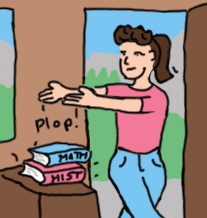Blog topic suggested by Nyla Bright.
Recursive title is recursive!
This year, I took on an adjunct teaching position, for fun and profit. Okay, also to get grad school credit toward a degree so people will consider hiring me to teach more. It’s my “active retirement” plan. Some people dream of opening a book shop; I’m gonna teach entry-level composition. Or at least qualify for one of those “writer in residence” things that all seem to require a master’s degree.
Also, I’d be serving the imprisoned population, which aligns with my values.
Breaking Down Concepts
Teaching has made me think a lot about communication, language, and what “craft” actually is. It’s easy to say “You need a clear thesis for this essay.” It’s harder to answer the question, “What does that mean?”
(It means make a one-sentence declaration, a stance on the topic, a firm opinion. One thing, go on, it’s okay. Yes, the issue is complex, but just talk about one part of it. You really have to take a stand! I get that you don’t feel qualified. You’ll be pulling evidence and support from these readings. Look at the question in the assignment. Answer that question. “I don’t know” is not a thesis statement. Well, you could try “There is no clear answer” as a thesis statement, and then show how both sides are strong, but it’ll be a harder paper… )
… the Thesis Building Assignment was tough.
Generally, I find myself tasked with breaking down the vagueness in vague rules. What does it mean to be “on topic”? What does it mean to “draw from the readings”?
And don’t get me started on the rules of grammar. English grammar is such a conglomeration of shifting sand. Students want simple, memorizable rules. We give them a heap of exceptions and “you’ll know it when you hear it.”
Aside from making me much more intentional about when I use commas and semicolons, this has me thinking about the clearest ways to bring information to the reader. I’m using less complex sentence structures more often. I’m getting leery of ambiguous words.
Maybe that’s not the best thing.
Reward Partial Success, Forgive Errors
Teaching also has me thinking about culture and context.
Our culture is a tiny bit sadistic. We punish failure instead of rewarding partial success. We know this isn’t the way humans learn, but we keep going back to that punishment-well. Other teachers in conference would bang on and on about how it wasn’t “fair” to give a student a pass because a disciplinary problem (solitary confinement for fighting) left them unable to turn in an assignment. Like… the student turned things in on time when they could, they don’t need to be smacked on the nose to learn that a deadline is a thing! Conflict in life happens! How could they have foreseen the need to turn in an essay before they got involved in a fight? But I was the only one in the meeting who felt that way, everyone else agreed that because it was a “bad thing” that caused them to miss the deadline, they should get zero on the assignment.
I digress. Obviously, I feel this was kicking someone while they were down. And no, I don’t care who started the fight. Why be so paternalistic? This has nothing to do with teaching essays.
I digress on digressing. I came upon other examples in the pedagogical literature that… well… to paraphrase, “all the psychologists agree that you shouldn’t punish, it doesn’t work, now here’s why you should be strict about rules because gosh WE had to do it this way!”
Consequently, students approach assignments, even rough draft assignments, as exercises in avoiding failure instead of taking risks or learning. One of my students made a simple, repeated error in their draft essay. I marked each instance and told them what they did wrong. When they turned in the final essay, they hadn’t changed a thing! I was livid! Did they not see my careful work helping them learn this grammar rule?
I emailed the student, giving them another chance to revise the essay to my notes. They responded with, “But I’m trying to write good from the start.” He didn’t feel he DESERVED to revise. My heart, it broke. I sent a rather long treatise on the glory of rough drafting and how I didn’t write “good from the start” myself.
Dang, this blog post had three revisions.
You spend 90% of your time on the top and bottom 2% of students
I struggled a lot with that student. I found there were two kinds of students that took up the majority of my time: students like this one that needed a lot of extra help, and the ones that were already great writers. The good writers kept turning in revisions to get extra points on their already-A papers. My fellow teachers tell me this is common. It could be fun getting into the deeper subjects with my star pupils, but I guarded my time to make sure I had enough for the ones still not sure what a thesis is.
I’m not sure I succeeded in dividing my time evenly, and it was hard for me to see three promising students drop out of the course because of external difficulties. Had I been too distracted by that top and bottom 2%?
I’m starting my second semester teaching now, and I intend to make sure I’m checking in regularly with all the students, even if it’s just a one-sentence email. People don’t assume they can reach out for help.
To Really Learn Something, Teach It
I learned to resent the genre of the academic essay. Still, it provides practice in critical reading and forming arguments in a way that can be graded. Damnit. I definitely understand the essay as a form better now.
Teaching is a lot of hard work. “Isn’t this taking time from your creative writing?” you might ask. “You’re supposed to be improving your craft in this MFA course, not being cheap labor for the school!” Well, the labor practices (*cough* abuses) around adjuncting aside, I found that teaching writing teaches the teacher about writing. The hardest work is the same work, in fact, as creative writing: clearly explaining complexities.
If I can finally explain what a thesis is in a simple, concise way, perhaps that practice will help me clearly explain a five-person fight scene in space? Who knows! Still reaching for those goals!

